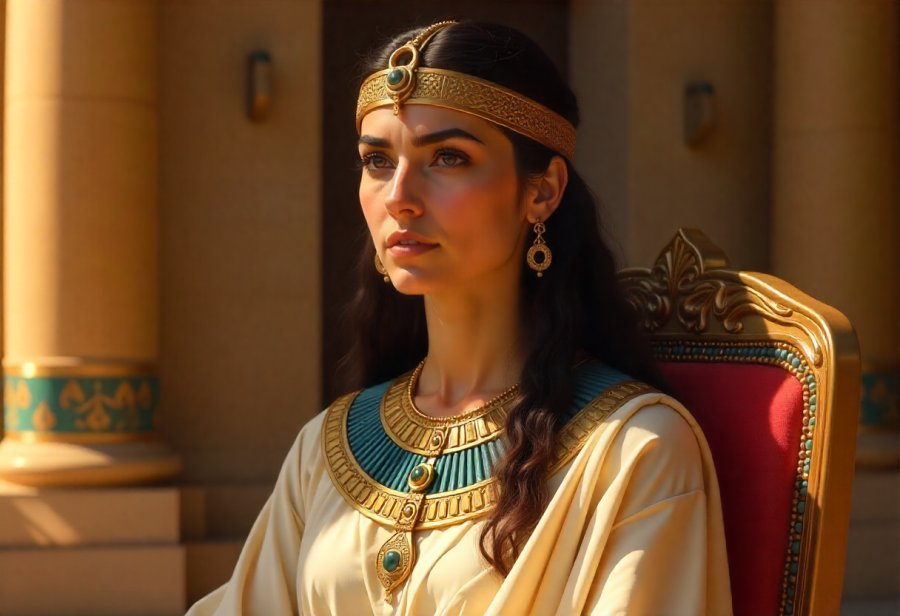Cleopatra VII is often remembered for her striking beauty, but her true legacy lies in her sharp intellect, political cunning, and resilience. She masterfully navigated a tumultuous landscape of internal family rivalries and external threats from Rome, transforming Egypt’s fate through strategic alliances, cultural diplomacy, and quick thinking. Her relationships with Julius Caesar and Mark Antony were far from personal romances—they were calculated moves to preserve her kingdom’s independence and extend her influence. Cleopatra’s ability to blend Egyptian traditions with Greek customs created a unifying image that bolstered her authority, showcasing that leadership rooted in cultural understanding and soft power can be as formidable as military might. Her story challenges us to reconsider what true influence entails—could her legacy be more about her strategic genius than her legendary allure? Her life exemplifies how intelligence, adaptability, and political savvy can leave an indelible mark on history, inspiring modern leadership in turbulent times.
Unveiling Cleopatra’s Influence: Beyond Beauty and Power
Cleopatra VII remains one of history’s most fascinating figures, not just for her striking beauty but for her sharp mind and strategic brilliance. She was more than a royal figure; she was a leader who understood the true sources of power—diplomacy, culture, and intelligence. Her ability to command respect from both her people and foreign powers set her apart as a ruler who wielded influence through wit and skill, not just authority.
Her reign was defined by a relentless effort to preserve Egypt’s independence amid a world increasingly dominated by Rome. Cleopatra’s leadership went beyond personal charisma; it was rooted in a deep understanding of political dynamics and a talent for manipulation and negotiation. Her alliances with Julius Caesar and Mark Antony were carefully crafted moves—more than personal relationships, they were strategic maneuvers to secure her position and extend her influence regionally.
But Cleopatra’s story isn’t solely about political tactics. She embodied a rich cultural identity that blended Egyptian traditions with Greek influences, making her a symbol of both heritage and innovation. Her court was a hub of arts, learning, and diplomacy—where soft power and cultural diplomacy played as crucial a role as military strength. This blend helped legitimize her rule and foster support across diverse Egyptian factions.
What makes her legacy especially compelling is her active role in shaping her own story. Cleopatra was not a passive figure waiting for fate; she actively built alliances, navigated court rivalries, and responded swiftly to external threats. Her resilience and adaptability kept her at the top despite the turbulent political landscape, proving that influence often comes from a sharp mind and strategic response.
Today, Cleopatra’s influence continues to resonate, inspiring countless stories, plays, and films that celebrate her intelligence, resilience, and leadership. Her legacy challenges stereotypes, showing that leadership rooted in cultural awareness, strategic thinking, and resilience can be just as powerful as brute force. She remains a symbol of how a ruler’s mind and determination can leave a lasting mark on history.
Foundations of a Reign: Egypt’s Turbulent Political Landscape
Before Cleopatra VII ascended to the throne, Egypt was already a land of shifting power and complex politics. The Ptolemaic dynasty, a Greek family line, had ruled Egypt for nearly three centuries, following Alexander the Great’s conquest and the subsequent fragmentation of his empire. This created a unique cultural landscape—Greek customs intertwined with native Egyptian traditions—which often led to internal tensions and court rivalries. The political scene was marked by intrigue, shifting loyalties, and fragile alliances, making loyalty a constant challenge for any ruler.
Cleopatra was born into this turbulent environment. Her father, Ptolemy XII, struggled to maintain control amid external threats and internal unrest, teaching her early on that power had to be earned through cunning and strategic thinking. When her father died, Cleopatra was still a teenager, faced with the difficult task of consolidating her claim to the throne. Court factions and family rivalries divided her support, and she had to navigate a landscape rife with treachery and competition.
Her initial rise to power was complicated by the presence of her younger brother, Ptolemy XIII, with whom she shared authority in a typical Ptolemaic arrangement. Such co-rulership was common but often led to conflict. Cleopatra’s determination and diplomatic skills enabled her to outmaneuver rivals, rally support, and establish her authority. Her early reign was a balancing act—managing internal disputes while also responding to external pressures from rising powers like Rome and Greece.
Egypt’s geopolitical position made it a coveted prize. Over centuries, foreign powers sought control of its rich resources and strategic location. The Ptolemaic rulers relied heavily on Greek military and political traditions, but Rome’s expanding influence posed a growing threat. Cleopatra understood that her kingdom’s independence depended on her ability to adapt and respond to these external forces, often through alliances, diplomacy, and cultural diplomacy—all tools she used skillfully to preserve her sovereignty.
Cultural tensions also played a role. While her family promoted Greek customs, many native Egyptians clung to their religious practices and traditions. Cleopatra recognized the importance of cultural diplomacy in legitimizing her rule. She blended Egyptian symbols with Greek influences, creating a unifying image that appealed to diverse factions within her kingdom. Her ability to navigate these internal and external complexities set the foundation for her remarkable reign and enduring legacy.
Mastermind of Diplomacy: Cleopatra’s Strategic Genius
Cleopatra’s diplomatic and political strategies were the foundation of her enduring influence and ability to maintain power in a turbulent era. She understood that leadership wasn’t just about asserting authority; it was about shaping perceptions, forging alliances, and responding flexibly to shifting circumstances. Her relationships with Julius Caesar and Mark Antony weren’t mere romances—they were carefully crafted political moves designed to bolster Egypt’s independence and extend her reach. By aligning with these powerful figures, she secured military support, legitimacy, and regional influence.
Inside Egypt, Cleopatra was a master at navigating court rivalries and factional disputes. She used marriage, negotiation, and cultural diplomacy as tools to consolidate her authority. Her keen ability to read her opponents’ motives allowed her to respond with calculated concessions, keeping her one step ahead of internal dissent and external threats. This adaptability created a stable foundation for her rule, even amid internal betrayals and external pressures.
Her decision-making was marked by a delicate balance of assertiveness and compromise. Cleopatra knew when to stand her ground and when to negotiate, tailoring her approach to each situation. Her alliances with Caesar and Antony weren’t just personal attachments—they were strategic moves that reinforced her political goals. Her charm and intelligence combined with calculated risks to turn potential vulnerabilities into sources of strength, demonstrating her mastery of soft power.
Clever military and political decisions further highlight her strategic brilliance. While she wasn’t a battlefield commander, Cleopatra understood the importance of projecting strength through diplomacy and alliances rather than brute force alone. She deployed her resources wisely, often relying on her allies’ military might to defend Egypt. Her ability to leverage cultural influence and political leverage helped her maintain control without unnecessary bloodshed, reinforcing her image as a ruler who commanded respect through influence.
Throughout her reign, Cleopatra’s capacity to adapt and manipulate the complex web of power around her was unmatched. Her intelligence allowed her to forge lasting alliances, outmaneuver rivals, and respond swiftly to external threats. This strategic agility kept her in power despite overwhelming odds, proving that influence often resides in wit and resilience rather than raw force. Her political craft made her a figure whose legacy extends beyond her time, illustrating that true leadership hinges on sharpness of mind and flexibility.
By mastering diplomacy, cultural diplomacy, and strategic foresight, Cleopatra transformed her vulnerabilities into strengths. Her ability to read situations accurately and respond with precision made her an exceptional leader. Her legacy shows that influence is built through understanding your environment and responding with purpose, not just through military might. Cleopatra’s strategic genius remains a testament to the power of intelligence and adaptability in shaping history.
Her mastery of diplomacy extended beyond her immediate court, as she actively engaged in regional alliances and cultural exchanges that solidified Egypt’s position in the Mediterranean. For those interested in exploring her strategic approach further, learning about the strategies of Cleopatra offers valuable insights into her enduring legacy of political ingenuity.
Decoding Cleopatra’s Leadership: Engagement Strategies and Insights
Studying Cleopatra’s leadership and intelligence goes beyond simply memorizing her alliances or battles. To truly appreciate her strategic mind, it’s helpful to examine her decisions within the broader political landscape she navigated. Analyzing her diplomatic moves, negotiations, and responses to external threats reveals her underlying priorities and thought process. Using primary sources—like her letters or accounts from her contemporaries—alongside modern analyses, offers a richer understanding of her tactics and leadership style.
Engaging with her story creatively can deepen your appreciation. Role-playing diplomatic scenarios, for example, puts her decision-making into perspective, helping you see her choices from her point of view. Visual tools such as mapping alliances or constructing timelines clarify how her strategies evolved and how she managed multiple fronts simultaneously. These approaches turn passive reading into active exploration, making her leadership feel more tangible and memorable.
Learning from her through the lens of expert insights further enriches this understanding. Many historians highlight her ability to read situations accurately and adapt quickly—traits essential for effective leadership. Delving into their analyses reveals the subtlety of her diplomacy and her skill at balancing internal rivalries with external pressures. Recognizing recurring themes like resilience, flexibility, and cultural diplomacy helps us see her as a master strategist, not just a historical figure.
Measuring her impact involves more than recounting her alliances or battles. It’s about evaluating how well her decisions held up over time—whether her alliances endured, her sovereignty was preserved, and her influence extended beyond Egypt. Critical reflection on these outcomes can reveal the true effectiveness of her leadership and help distinguish myth from reality. This approach fosters a balanced view, appreciating her achievements while acknowledging the challenges she faced.
Incorporating multimedia and modern perspectives makes her story more accessible and engaging. Creating visual projects, podcasts, or interactive timelines can bring her diplomatic strategies to life, making her tactics relevant today. Framing her leadership within contemporary ideas like gender dynamics or political resilience offers fresh insights into her legacy. These creative methods transform her story into an immersive learning experience that resonates across generations.
Legacy of Wisdom: Key Lessons from Cleopatra’s Leadership
Cleopatra’s story reminds us that true influence stems from intelligence, strategic thinking, and resilience. Her ability to navigate a volatile political landscape, forge vital alliances, and safeguard Egypt’s independence showcases leadership driven by insight rather than brute force. Her relationships with Julius Caesar and Mark Antony weren’t just personal bonds—they were carefully designed political moves that extended her reach and secured her position. Cleopatra turned potential vulnerabilities into strengths, demonstrating that influence often depends on foresight and adaptability.
Her resilience wasn’t about stubbornness; it was about flexibility. She knew when to stand firm and when to pivot, always keeping her country’s interests at the forefront. Managing internal rivalries and external threats required quick thinking and a calm, strategic approach. This ability to respond effectively, even under pressure, kept her in power despite overwhelming odds. Her leadership underscores the importance of staying adaptable in the face of constant change.
Cultural diplomacy played a crucial role in her influence. By blending Egyptian traditions with Greek customs, Cleopatra created a unifying image that resonated across diverse groups. This skill in shaping perception reinforced her legitimacy and helped maintain stability within her realm. Her mastery in using soft power—culture, negotiation, and alliance-building—demonstrates that influence isn’t solely achieved through military might but through understanding and shaping perceptions.
Her legacy offers lessons for today’s leaders. The importance of strategic foresight, cultural awareness, and resilience remains relevant in any turbulent environment. Cleopatra showed that effective leadership involves reading your environment carefully, making calculated moves, and maintaining the flexibility to adapt as circumstances shift. Her story encourages us to see influence as a dynamic process rooted in wit, insight, and persistence.
What sets Cleopatra apart is her active role in shaping her destiny. She was a leader who built her story through calculated decisions and relentless determination. Her ability to manipulate complex power dynamics and respond swiftly to external pressures highlights that leadership rooted in intelligence and resilience can leave a lasting mark. Her legacy challenges the notion that power is solely about force; it’s about understanding and influencing the perceptions of others.
Her influence extended beyond her lifetime because she understood that leadership isn’t static. It’s an ongoing process of reading situations accurately and responding with purpose. Cleopatra’s mastery of diplomacy, cultural diplomacy, and strategic agility allowed her to turn challenges into opportunities. Her story reminds us that the most enduring legacies are built on a foundation of sharp minds and steadfast resilience.
In the end, Cleopatra’s life exemplifies that leadership rooted in insight and adaptability can shape history just as powerfully as armies or empires. Her ability to craft alliances, manage internal and external pressures, and stay true to her vision underscores the importance of strategic thinking. Her legacy continues to inspire those who believe that influence is a skill to be cultivated through intelligence, resilience, and a willingness to adapt—traits that remain vital in any era.









